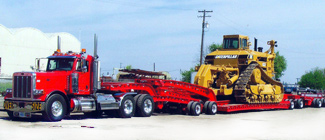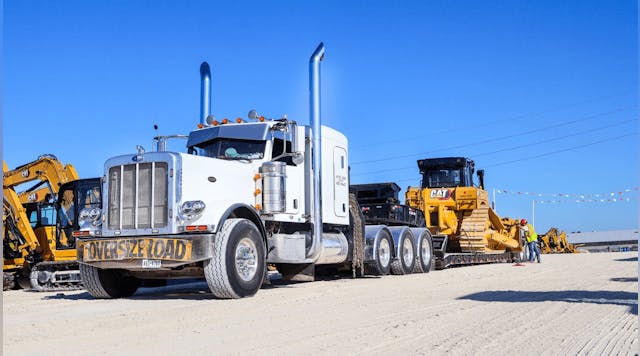How Does Heavy Haul Trucking Handle Oversized Freight

In today’s industrial world, the need to transport massive machinery and materials safely is greater than ever. Industries such as construction, mining, agriculture, and energy all depend on reliable logistics providers to move equipment that cannot fit standard shipping methods. This is where heavy haul trucking comes into play. By using specialized equipment, skilled drivers, and advanced planning, heavy haul services ensure oversized freight reaches its destination securely and efficiently.
What Is Heavy Haul Trucking?
Heavy haul trucking refers to transporting cargo that exceeds standard weight and dimension regulations for trucks on highways. Loads such as bulldozers, turbines, bridge beams, and oil rig components often fall into this category. Unlike general freight shipping, these moves require specialized trailers, route planning, and permits from state and local authorities.
The goal is not simply to move oversized freight but to manage the process in a way that minimizes delays, avoids safety hazards, and complies with all legal requirements.
Specialized Equipment for Oversized Freight
The success of heavy haul trucking relies heavily on the equipment used. Standard trailers cannot handle the size and weight of oversized loads, which is why logistics providers use custom-built hauling solutions.
Examples of specialized trailers include:
-
Lowboy trailers with lowered decks for tall equipment.
-
Extendable flatbeds designed for long cargo like beams or turbines.
-
Removable gooseneck trailers (RGN) that allow machinery to be driven directly onto the trailer.
Choosing the right trailer reduces risks and ensures the load can travel without exceeding clearance or weight restrictions.

Careful Planning and Route Management
Transporting oversized freight is not a simple pickup-and-deliver operation. Planning plays a critical role. Logistics providers conduct site surveys, measure cargo, and evaluate infrastructure limitations before the move begins.
Routes are carefully mapped out to avoid low bridges, tight turns, or weight-restricted roads. In many cases, the transport may be scheduled for early morning or late-night hours to reduce traffic disruptions. This level of preparation ensures safe and timely deliveries while minimizing costly setbacks.
Safety Considerations in Heavy Haul Trucking
Safety remains the top priority when handling oversized freight. Because of the size and weight of the loads, a small error can result in major delays or accidents. Professional logistics providers focus on three major safety areas:
Load securement: Cargo must be strapped and chained in place to prevent shifting.
Escort vehicles: Some moves require pilot cars to guide the truck and warn other drivers.
Driver expertise: Heavy haul drivers undergo specialized training to manage longer stopping distances, wide turns, and reduced maneuverability.
These safety measures protect not only the freight but also other motorists sharing the road.
Compliance and Permits
Every oversized shipment requires permits. Regulations vary across states and municipalities, making compliance one of the most challenging aspects of heavy haul trucking. Permits cover limits on axle weight, approved travel hours, and sometimes even weather restrictions.
Without these legal documents, transportation can face delays or fines. By working with a professional logistics provider like Walker Logistics, businesses ensure all compliance requirements are handled efficiently.
The Business Benefits of Heavy Haul Trucking
For companies dealing with oversized equipment, heavy haul trucking services offer more than just transport—they provide peace of mind. Some benefits include:
-
Operational efficiency – Delivers equipment on time, reducing project delays.
-
Cost savings – Minimizes damage risks that could result in expensive repairs.
-
Reliability – Provides consistent service for recurring industrial projects.
This is why industries often partner long-term with specialized logistics companies rather than attempting to manage oversized freight on their own.
Challenges Faced in Heavy Haul Transport
While effective, heavy haul trucking comes with unique challenges. Infrastructure is often the biggest hurdle older bridges, narrow roads, and sharp turns can complicate route planning. Weather also plays a role, as rain, snow, or high winds may restrict travel.
Another challenge is balancing costs while ensuring safety and compliance. Permits, escort vehicles, and specialized equipment add expenses, but these investments are essential to protect valuable cargo.

Why Professionals Make the Difference
Professional heavy haul providers have the experience, equipment, and trained staff to manage every aspect of oversized freight transportation. From securing permits to choosing the right trailer, each step is handled with precision.
This level of expertise ensures not only safe transport but also business continuity. For industries relying on equipment worth millions of dollars, professional heavy haul trucking is not an option, it’s a necessity.
Conclusion
Heavy haul trucking plays a crucial role in transporting oversized freight that cannot be managed through conventional methods. With specialized trailers, careful planning, and strict compliance, providers like Walker Logistics ensure businesses receive their equipment safely and on schedule. For industries that depend on large-scale machinery, investing in professional heavy haul trucking is key to maintaining operational success.
FAQs
What types of loads require heavy haul trucking?
Oversized machinery, turbines, bridge beams, and industrial equipment often need heavy haul services.
Are permits always required for oversized freight?
Yes, permits are mandatory for oversized loads and vary by state or region.
What equipment is commonly used for heavy haul trucking?
Lowboys, extendable flatbeds, RGNs, and multi-axle trailers are frequently used.
How do companies ensure safety during heavy haul moves?
They use load securement systems, escort vehicles, and trained drivers.
Why hire professionals for heavy haul transport?
Professionals manage compliance, equipment, and logistics, reducing risks and delays.
- Art
- Causes
- Crafts
- Dance
- Drinks
- Film
- Fitness
- Food
- Games
- Gardening
- Health
- Home
- Literature
- Music
- Networking
- Other
- Party
- Religion
- Shopping
- Sports
- Theater
- Wellness



